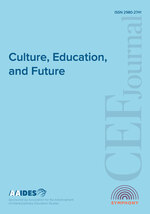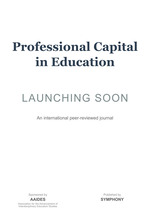The method of currere in M. R. Carey’s The Girl With All the Gifts
DOI:
https://doi.org/10.70116/3065457240Keywords:
Currere, narrative, carceral classroom, educational experienceAbstract
The Girl With All the Gifts depicts the struggle of a group of humans who embark on a journey of survival with a gifted girl named Melanie. Although the narrative is not set in the context of education, the military and scientists in the story set up a carceral classroom to investigate the infected children’s abilities, including Melanie. In the classroom, the learning initiates Melanie’s self-realization as the next person during the outbreak of the hungries plague, demonstrating Pinar’s method of currere. This paper examines how Melanie’s self-realization embodies the four steps in the method of currere and discusses the educational experience within two confrontational views on education presented in this narrative.
Downloads
References
Carey, M. R. (2014). The girl with all the gifts. Orbit.
Gereluk, W. (1974). Alienation in education: A Marxian re-definition. McGill Journal of Education, 9(1), 34-50.
Hamilton, S. E. (2021). The girl with all the gifts: Eco-zombiism, the anthropocalypse, and critical lucidity. Literature Interpretation Theory, 32(4), 285-304. https://doi.org/10.1080/10436928.2021.1977567 DOI: https://doi.org/10.1080/10436928.2021.1977567
Lefebvre, H. (2014). Critique of everyday life: The one-volume edition. Verso.
Ogden, H. (2020). Doubt. In J. Wearing, M. Ingersoll, C. Deluca, B. Bolden, H. Ogden, & T. M. Christou (Eds.), Key concepts in curriculum studies (pp. 53-54). Routledge.
Pinar, W. F. (1972). Working from within. Educational Leadership, 29(4), 329-331.
Pinar, W. F. (1975a). Currere: Toward reconceptualization. In W. F. Pinar (Ed.), Curriculum theorizing: The reconceptualists (pp. 396-414). McCutchan.
Pinar, W. F. (1975b). Sanity, madness, and the school. In W. F. Pinar (Ed.), Curriculum theorizing: The reconceptualists (pp. 359-383). McCutchan.
Pinar, W. F. (1994). The method of currere. In W. F. Pinar (Ed.), Autobiography, politics, and sexuality: Essays in curriculum theory 1972-1992 (pp. 19-27). Peter Lang. (Reprinted from the method of “currere”, 1975, April, Annual Meeting of the American Research Association, Washington, D.C., United States)
Pinar, W. F. (2008). Curriculum theory since 1950: Crisis, reconceptualization, internationalization. In F. M. Connelly, M. F. He, & J. Phillion (Eds.), The SAGE handbook of curriculum and instruction. Sage Publications. https://doi.org/10.4135/9781412976572 DOI: https://doi.org/10.4135/9781412976572.n25
Pinar, W. F. (2012). What is curriculum theory? (2nd ed.). Routledge. https://doi.org/10.4324/9780203836033 DOI: https://doi.org/10.4324/9780203836033
Pinar, W. F. (2015). Educational experience as lived: Knowledge, history, alterity. Routledge. https://doi.org/10.4324/9781315752594 DOI: https://doi.org/10.4324/9781315752594
Pinar, W. F. (2020). Currere. In J. Wearing, M. Ingersoll, C. Deluca, B. Bolden, H. Ogden, & T. M. Christou (Eds.), Key concepts in curriculum studies (pp. 50-52). Routledge. DOI: https://doi.org/10.4324/9781351167086-11
Pinar, W. F., & Grumet, M. R. (1976). Toward a poor curriculum. Kendall/Hunt.
Pinar, W. F., Reynolds, W. M., Slattery, P., & Taubman, P. M. (2004). Understanding curriculum: An introduction to the study of historical and contemporary curriculum discourses. Peter Lang.
Downloads
Published
How to Cite
Issue
Section
License
Copyright (c) 2024 Symphony

This work is licensed under a Creative Commons Attribution 4.0 International License.










